
- Fine-Tuning the Chemistry of Solar Cells
- Accelerating the Next Generation of Medical Isotopes
- Young Crop of Scientists Descends on UBC Campus
- UBC Researchers Discover Clues to Improve Salmonella Vaccines
- Green Makeover for Historic Chemistry Building
- Stick Insects and Natural Selection
- Featured Future Alum: Kimberly Hancock (Environmental Sciences)
- Class Connections + Kudos
Fine-Tuning the Chemistry of Solar Cells
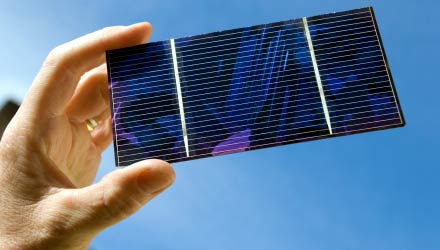
Better solar cells are just some of the sustainability solutions UBC Chemistry graduate students are investigating--with help from Mountain Equipment Co-op.
Solar energy holds a ton of potential. The amount of energy in sunlight striking the earth for 40 minutes is enough to power the world for a year. The tough part: finding effective ways to capture and convert that sunlight into usable power. That's a large part of the reason that Matt Roberts and Angela Kuchison, doctoral candidates in the Department of Chemistry supported by the MEC Graduate Research Fellowship in Sustainability, are investigating more effective ways to harness solar power.
"More than two-thirds of the research groups in the Department of Chemistry conduct pure research of relevance to sustainability," notes Ed Grant, head of the department. "The MEC fellowship really encourages our students to work hard in fields contributing to innovations in sustainability. It also underscores the commitment of MEC and UBC Science to sustainability--not just in the teaching and research endeavor, but as a business practice."
Roberts' research focuses on a class of platinum-based compounds used as photo-sensitizers, which can absorb the sun's light and convert it from light energy into chemical energy. That chemical energy can in turn be used to power other reactions, like splitting water to form hydrogen, a clean alternative fuel source.
Kuchison is exploring the problem from a slightly different angle: looking at the potential of using new chemical compounds in dye-sensitized solar cells, a new class of cells that are cheap to manufacture. "Developing alternative energy sources is key for the future of the planet," she notes. "The willingness of a local company to support sustainable research not only encourages me to investigate new solutions, but gives me hope that business can help push this agenda forward."
Support from MEC is helping Simone Gross study how common atmospheric pollutants react with organic substances—substances that are found in high concentrations over smoggy cities. The fellowship has allowed Gross to focus on her work—work that could be crucial in estimating and tracking the impact these reactions have on human health and the environment. Kyle Parker is also harnessing the power of chemistry to investigate sustainability issues: in this case, ways to form nitrogen-containing compounds (the basis of much of the world's fertilizer supply) without ammonia. Processes that use ammonia to create nitrogen fertilizer consume between one and two per cent of the world's energy supply.
"Awards like the MEC Fellowship serve an important role in getting students to look closely at how we solve certain problems through their research—not just in our private lives, but on a larger scale," says Parker. "It's encouraging to see businesses take an interest, and make a financial contribution to help develop and investigate new ways of solving environmental problems."
Green Makeover for UBC's Historic Chemistry Building
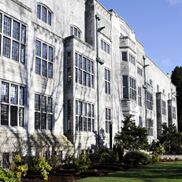 A cost-effective and environmentally friendly facelift of UBC's 93-year-old Chemistry Building wrapped up this spring, breathing new life into one of campus' most beloved landmarks (once known as the Science Building). The renovation combines new lecture theatres, state-of-the-art laboratories and a seismic upgrade, all while maintaining the stone shell of the historic building. Refurbishing the complex—instead of rebuilding it—saved $16 million of taxpayers' money, diverted 323 tons of solid waste from landfills, and prevented 1,155 tons of carbon emissions from being released into the atmosphere. [Photo: Marten Dee]
A cost-effective and environmentally friendly facelift of UBC's 93-year-old Chemistry Building wrapped up this spring, breathing new life into one of campus' most beloved landmarks (once known as the Science Building). The renovation combines new lecture theatres, state-of-the-art laboratories and a seismic upgrade, all while maintaining the stone shell of the historic building. Refurbishing the complex—instead of rebuilding it—saved $16 million of taxpayers' money, diverted 323 tons of solid waste from landfills, and prevented 1,155 tons of carbon emissions from being released into the atmosphere. [Photo: Marten Dee]
Accelerating the Next Generation of Medical Isotopes
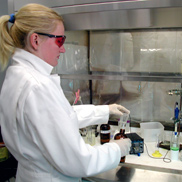
Researchers at UBC and TRIUMF—Canada's world-class subatomic physics lab and cyclotron—are working on an idea that could shakeup how Canada produces medical isotopes. The plan? Knit Canada's particle accelerators and nuclear physics labs together into a network of excellence that can discover new ways to produce isotopes, and drive innovation in how they're used to fight disease.
The effort has the potential to maintain Canada's leadership in the development and supply of radioisotopes—substances that allow advanced medical imaging, and targeted treatment of cancers, HIV-AIDS and other diseases. "Molecular biology is identifying more and more disease pathways that we could target with medical isotopes, basically outpacing our ability to supply the imaging and therapeutic agents to treat them," says Tom Ruth, a senior research scientist at TRIUMF and the BC Cancer Agency.
Right now, only a few institutions in Canada supply isotopes and the associated technologies, but new labs and resources are coming online. Ruth and the project's potential partners, who could include universities, hospitals and health care agencies across Canada, would like to establish a network that would enable the centres to share resources and expertise. The idea, still a few years from fruition, might help augment the supply of isotopes from nuclear reactors, and ultimately help advance treatments for some devastating illnesses.
Young Crop of Scientists Descends on UBC Campus for Fairs and Challenges
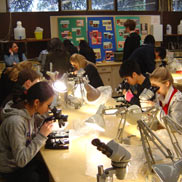 UBC Science helps play host to students from across the Lower Main Land this spring, as young scientists converge on campus for Let's Talk Science and the Greater Vancouver Regional Science Fair.
UBC Science helps play host to students from across the Lower Main Land this spring, as young scientists converge on campus for Let's Talk Science and the Greater Vancouver Regional Science Fair.
The Let's Talk Science All Science Challenge brings teams of secondary school students to UBC to compete in a variety of science and engineering activities on May 14. Students spend months getting ready for the event, and 400 graduate and undergraduate student, faculty and staff volunteers from UBC help arrange activities. The public is invited to participate in the fun, which includes CSI-style DNA extraction, bottle rockets, and a science magic show. [Photo: Nancy Nguyen]
Last month, UBC Science played host to more than 300 high school students from across the Lower Mainland at the annual Greater Vancouver Regional Science Fair. Lab tours arranged by UBC Science's Eliza Ng and Carola Hibsch-Jetter gave students a taste of real-world research, and the Faculty presented entrance awards to the best projects.
Linda Liu (Sands Secondary) and Cherry Gao (Sutherland Secondary) won UBC Science Entrance Awards for their project studying the effect of Zizyphus jujuba extract on cancer cells. Both will be going on to the Canada Wide Science Fair later this May. Karen Yu and Janny Xuechen Ke, both from Sir Winston Churchill Secondary, also took home awards. A big thank you to the dedicated science students who volunteered during the Fair: Sonja Babovic, Alistair Scott, Dan Minster, Evan Shao, Leigh Beamish, Ruby Cheung, Chummy Fan, Erica Kohos, Paul Gosset, Katharina Piche, Philip Provencher, Adel Mazanderani, Marjorie Laven, Ann Sun, Karanvir Sall, Megan Sherman, Shima Khayambashi, Tammy Tai, Angela Soon, Angela Liao, Adrian Verster, JJ Maclean, Andy Lee, Hayoung Yoo, Emily Leflamme, Mariko Vaughan, Vivan Wang, Jay Zhang, Tagh Sira.
» Watch the All Science Challenge on YouTube
UBC Researchers Discover Clues to Improve Salmonella Vaccines
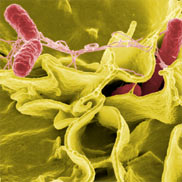 UBC Researchers have discovered an anti-virulence factor in Salmonella, knowledge could be used to improve vaccines against infection by the food-borne bacteria. The finding suggests that there is a distinct pathway in Salmonella that controls the virulence of the resulting infection, which strikes a reported 6,000 to 12,000 Canadians a year.
UBC Researchers have discovered an anti-virulence factor in Salmonella, knowledge could be used to improve vaccines against infection by the food-borne bacteria. The finding suggests that there is a distinct pathway in Salmonella that controls the virulence of the resulting infection, which strikes a reported 6,000 to 12,000 Canadians a year.
"This research will allow us to design improved salmonella vaccines," says Brett Finlay, senior investigator at the Michael Smith Laboratories. "We'll be able to better tailor the vaccine strain with the appropriate level of virulence." The research also indicates that Salmonella can control its virulence before it enters the body, notes Finlay. "The pathway is designed to initially control the level of virulence and not kill the host immediately." That allows the bacteria to establish itself in the host, and then become more virulent.
Salmonella infect a variety of vertebrae hosts. Salmonellosis—infection from Salmonella—can lead to gastroenteritis or typhoid fever (a life-threatening disease).

Send Us Website Feedback, Win a Coveted UBC Science T-shirt!
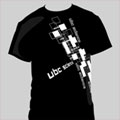 We want your feedback on UBC Science Connect and the Faculty's new website. UBC Science t-shirts, water bottles and business card holders are up for grabs! And congratulations to last month's prize winners: Priscilla Fung (BSc 2002), Griffin Lloyd (BSc 1951), Judith Gilley (BA 1987, MA 1990, PhD 1995) and Fiona MacPherson (BSc 1989). We appreciate the feedback!
We want your feedback on UBC Science Connect and the Faculty's new website. UBC Science t-shirts, water bottles and business card holders are up for grabs! And congratulations to last month's prize winners: Priscilla Fung (BSc 2002), Griffin Lloyd (BSc 1951), Judith Gilley (BA 1987, MA 1990, PhD 1995) and Fiona MacPherson (BSc 1989). We appreciate the feedback!

Stick Insects and Natural Selection: Zoology Post-Doc Helps Prove Darwin Right
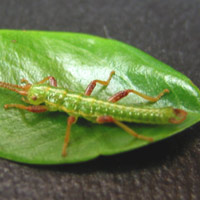 A post-doctoral fellow with the Department of Zoology has conducted the first in-nature experiments that show environmental adaption accelerates the development of new species. "As far as advancing Darwin's theory that natural selection is a key driver of speciation, this is the first experiment of its kind done outside of a lab," says Patrick Nosil of the findings, published in PLoS ONE.
A post-doctoral fellow with the Department of Zoology has conducted the first in-nature experiments that show environmental adaption accelerates the development of new species. "As far as advancing Darwin's theory that natural selection is a key driver of speciation, this is the first experiment of its kind done outside of a lab," says Patrick Nosil of the findings, published in PLoS ONE.
Nosil studied walking-stick insects in southern California--insects that often exhibit colours and patterns that match their host plants. By moving some insects from their customary host plant and protecting others from predators, Nosil found that colour pattern alone could initiate speciation, while natural selection on other traits (like the ability to detoxify the host-plant's defensive chemicals) were needed to complete the creation of a new species.
Featured Future Alumni
Kimberly Hancock (Environmental Sciences)

Anticipated graduation: 2009.
Current Science Co-op Position: Environmental quality, integrated pest management co-op, British Columbia Ministry of Environment.
Best UBC memory: I helped my previous co-op employer—an environmental consulting firm—inventory the hazardous tanks on UBC campus. Getting to see the inner workings and secret corridors of the all buildings on campus (especially the really old ones) was very fun! Hopefully, I'll never get lost on campus again.
Favourite professor or course: That would definitely be Dr Michael Hawkes, who taught my introductory ecology course. His enthusiasm (and appropriate use of The Far Side comics) sparked my interest in plant ecology.
Importance of science background: I still don't have a set plan for what I want to do when I finish my degree, but a solid science background is going to enable me to pursue whatever possibilities open up after graduation.
Most memorable co-op experience: Working on anti-idling initiatives in the Sea-to-Sky corridor was really exciting. Presenting information about idling education and by-laws to the local air quality committee—and having some of the ideas moved forward—gave me a great feeling!
Overall UBC Science experience: UBC Science, and especially the Science Co-op program, have given me fantastic opportunities, and allowed me to work with great people. I'm very glad to have chosen this program.
Class Connections
1950's
After graduating from UBC, Michael Rose (1959, Math-Physics) worked for the Department of Transport for four years before heading to McGill to earn a MSc in meteorology. His career path took him to Environment Canada in Vancouver, then to Victoria to work with the Provincial Environment Ministry, and finally to the British Columbia Systems Corporation, which he helped found. Rose retired in 1994 to enjoy golf and fishing on beautiful Vancouver Island.
Encouraged by Professor MY Williams to switch from physics to geology, Griffin Lloyd (1951, Geology) studied under Vladimir Okulitch and Bill Mathews and went on to spend his entire career in the geological sciences. He's currently working as an exploration geologist in Thailand, where he accidently discovered some of the first fossilized dinosaurs in the country. Lloyd remembers a very different UBC—one that had 5,000 students and very small geology classes. Widowed a few years ago, Lloyd's retirement plans include studying beach rocks (at his leisure) and visiting the Beaty Biodiversity Museum's upcoming blue whale exhibit.
1960's
After nearly four decades of research and librarianship, James W Markham (1969, Marine Botany) is helping the Cheadle Centre for Biodiversity and Ecological Restoration at the University of California Santa Barbara catalog its algal collection. As a UBC graduate student and post-doc, Markham carried out an extensive survey of marine algae in northern Oregon, and donated the resulting collection to the UBC Algal Herbarium. After UBC, Markham continued to collect algae (increasing his personal collection to several thousand specimens) and also took an interest in library science, earning an MLS and becoming a librarian at UC in 1986. Not surprisingly, the next year he donated his personal algal collection to the Cheadle Centre. In 2006, Markham retired, was named Librarian Emeritus and joined the Centre as Associate Curator of Algae. He's currently reliving his UBC algae glory days, using catalogue data from the UBC collection he helped bolster to jumpstart a similar cataloguing project at the Cheadle Centre.
After spending his entire working life in corporate management and finance, David Smith (1969, Chemistry, Honours) decided to pursue a lifelong passion for photography. Despite his chemistry background, Smith (somewhat ironically) leaped into the world of digital photography, and now lectures on travel photography, world travel adventures, living the dream, and why being passionate improves your work and home life. You can view his travel, wedding and corporate photography business online—and might just see Smith on campus: "I do visit the UBC campus once in a while and I always have a sticky cinnamon bun when I'm there to relive the good old times!"
1970's
Eva Derton (Hitchen, nee Taussig) (1972, Chemistry) works at Simon Fraser University, making sure an undergraduate teaching lab that serves 700 chemistry students a semester runs smoothly, efficiently and safely. She's held the position since 1975. Late last year, Derton took a break and spent three weeks as a civilian volunteer in Israel. The work, arranged through Canadian Volunteers for Israel, involved assembling communication equipment. "I felt that what I was doing was useful and appreciated."
1980's
After completing his degree, Kelvin Mah (1985, Microbiology and 1992, Dentistry) went on to study dentistry at UBC. His successful practice is located in Kitsalano, Vancouver.
2000's
As a new faculty member with Michael Smith Labs, Joanne Fox (2002, Genetics) channels her enthusiasm for teaching into outreach activities run out of MSL. A UBC Genetics Graduate Program alumnus, Fox brings her research experience into the new role by designing high school field trips that use bioinformatics to present cutting edge research in a way that touches student's lives. "My favorite activity is to show high school students how to browse the human genome using the web. Bioinformatics is a great way to get kids using computers and excited about science. When they see the power of this information at their own fingertips, the enthusiasm is contagious." Fox also motivates students to pursue the sciences by teaching at the undergraduate level. She introduced hands-on, computer-lab research into the bioinformatics course she co-teaches in Microbiology and Immunology, and has joined an interdisciplinary teaching effort run by the faculties of Science and Arts. The Terry project includes a global citizenship speaker series, a blog and website, and a second-year course that deals with global issues in the arts and sciences.
Eric Findlay (2005, Computer Science) followed up his degree with a BEd (Secondary) in Computer Science and Math, which he completed in 2007. He was recently hired as a teacher-on-call with Richmond Christian School, and taught his first class this March (which including teaching movie editing software). Findlay is still coding in his spare time, and one of his hobbies is writing programs for Texas Instruments graphing calculators.
Ryanne James (2007, Microbiology and Immunology) began working in science education outreach as an undergraduate at UBC, and parlayed that passion into a career after graduation. James coordinates three of UBC Science's outreach programs: Science 101, CEDAR and the Environmental Sciences and Fisheries Roadshow. Science 101 is a four-month, non-credit, barrier free course offered to residents of Vancouver's Downtown Eastside and other inner-city communities. CEDAR and the Fisheries Roadshow focus on promoting science education for Aboriginal youth and providing resources for Aboriginal youth interested in the field. James is a strong believer in the importance of community, and thoroughly enjoys the opportunity to bring these programs to Vancouver, and to Aboriginal communities.
Recent travels? A new family addition? A promotion or career transition? Whatever it is, we'd love to hear from you. Connect by sending a brief note to: science.connect@ubc.ca. We'll make every effort to include it in our next issue.
Events
UBC Science at Alumni Weekend
Abdul Ladha Science Student Centre, Open House
» May 24, 2008: 2 to 4 pm
Let's Talk Science Biology Workshop for Kids
» May 24, 2008: 2 to 4:15 pm
Pacific Museum of the Earth, Free Public Tour
» May 24, 2008: 10:30 to 11:30 am
How do Microbes Change the World?: Classes Without Quizzes
» May 24, 2008: 10:30 to 11:30 am
Tide-Pooling at Whytecliff Park: Classes Without Quizzes
» May 25, 2008: 3 to 5 pm
Other Events
BC Science Outreach Fair
At the Vancouver Public Library Promenade Library Square Conference Centre.
» May 8, 2008: 4 to 8 pm
Biodiversity Lecture
This talk by renowned polar bear researcher Ian Stirling is presented by the Beaty Biodiversity Museum.
» May 11, 2008: 6 pm, Instructional Resources Centre
All Science Challenge
The public is welcomed at this competition for secondary school students from across the Lower Mainland.
» May 14, 2008: 8:30 am to 3 pm, UBC Hebb Theater
UNEARTHING A GIANT
SEA MAMMAL
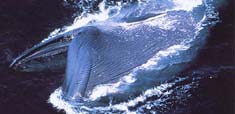
Last issue we told you about a team of researchers that are working to unearth and prepare the skeleton of a 25-metre blue whale for exhibition at UBC's Beaty Biodiversity Museum. Well, the digging begins on May 14, and you'll be able track the team's progress on the Museum website.
May Synergy Sneak Peek
The upcoming May issue of Synergy looks at fuel cell research, PET studies of Parkinson’s disease, the complexities of geological catastrophes, technology transfer successes in immunology and physics research, and more.
Green Vanity Fair Features UBC Fisheries Researcher
UBC fisheries researcher and Zoology faculty member Daniel Pauly rubs elbows with the likes of Ted Danson, Mary Steenburgen and Sam Waterson in April’s issue of Vanity Fair. The popular magazine calls Pauly one of "the activists, agitators, scientists and superstars who are fighting for us all."
KUDOS
Immunology and Zoology Researcher Earns Health Funding Award
Ninan Abraham, assistant professor with the departments of Microbiology and Immunology, and Zoology, has been named a Canadian Institutes of Health Research New Investigator. The $300,000 award will support Abraham's research into the regulation of T-cell development, function and transformation.
Kellogg Booth Recognized by Human Computer Communications Society
Professor Kellogg Booth, Department of Computer Science, has been awarded the 2008 Achievement Award by the Canadian Human Computer Communications Society in recognition of his contributions to the development of computer graphics, visualisation and human-computer interaction in Canada.
Statistics Professor Wins National Honour
Paul Gustafson, professor in the Department of Statistics, has been awarded the 2008 Centre de recherches mathématiques-Statistical Society of Canada Prize for his work applying Bayesian statistical methodology to epidemiology and public health.
Zoology Researcher Donates Prize Money to Biodiversity Museum
Sally Otto, the 2007 Steacie Prize recipient, has donated the $15,000 in prize money that goes with the award to UBC's new Beaty Biodiversity Museum. The museum, set to open in 2009, will be the first of its kind in Canada--a public education centre that focuses entirely on biodiversity.
Computer Science Professor Wins 2008 Charles McDowell Award
Associate Professor Karon MacLean has received the 2008 Charles McDowell Award for Excellence in Research. The award, one of UBC's most prestigious, is made to an outstanding young faculty member who has demonstrated excellence in pure or applied scientific research.
Physics and Astronomy Profs Honoured for Peer Review Work
Professors Ian Affleck and Douglas Scott—both with the Department of Physics and Astronomy—have been named 2008 Outstanding Referees by the American Physical Society. This is the inaugural issue of the designation, which will go to roughly 130 of the Society's 42,000 active referees each year.
European Fellowship Awarded to Math Professor
Stephanie Van Willigenburg, associate professor in the Department of Math, has been awarded a 2008 Humboldt Research Fellowship, which carries with it an extended period of research in Germany. The Alexander von Humboldt Foundation is a German non-profit foundation that promotes international research cooperation.
UBC Students in Top 25 at 'Cyber Super Bowl' in Banff
Computer science students from UBC ranked among the world's brightest at this year's International Programming Competition, placing 23rd in a competitive field of 100 teams.
Brockhouse Medal Goes to UBC Professor
Professor Jess Brewer, Department of Physics and Astronomy, has been awarded the 2008 Brockhouse Medal for outstanding experimental or theoretical contributions to condensed matter and materials physics.
UBC SCI FACTS
1975: Good Years for TRIUMF Founder
Physics professor and cyclotron founder Erich Vogt becomes UBC's Vice President (1975-1981) and an Officer of the Order of Canada a year later.
1993: Nobel for Reprogramming DNA
Michael Smith wins the Nobel Prize for Chemistry for his groundbreaking work reprogramming DNA segments--known as site-directed mutagenesis.
GIVING OPPORTUNITIES
There are many ways to support UBC Science, including gifts left in wills, gifts of security or gifts of life insurance. For more information about giving options please contact Esther Jang:
P: 604-827-4464
E: esther.jang@ubc.ca
OUTREACH AND COMMUNITY
Most Exceptional Escapades in Science Reaches Out to Students
Reaching out to students in grades 8 to 12, the Michael Smith Labs hosted this inaugural high-school science conference in March. The event showcased hands-on activities, and offered students the opportunity to meet UBC researchers: Dr Dave Ng, Dr Joanne Fox, Dr Jane Roskams, Dr Brett Finlay, Dr Daniel Pauly, Dr Jaymie Matthews and Dr Phil Hieter. The conference is part of MSL's extensive educational outreach activities.
Science Co-op
UBC Science Co-op is an ideal way for employers to find help for short-term projects. Science students are looking for opportunities that will integrate their academic education with related work experience. Contact the co-op office to discuss your requirements.
E: www.sciencecoop.ubc.ca
P: 604-822-9677

